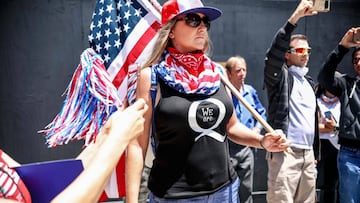What is QAnon and why has Twitter deleted some accounts related to it?
Up to 150,000 accounts around the world may be affected by the latest action taken by the social media company in its bid to stop the coordinated spread of disinformation.


On Tuesday night a message was, appropriately enough, tweeted from the official account of Twitter’s safety team stating that accounts linked to a group known for sharing disinformation and spreading unfounded conspiracy theories had been deleted. There are said to have been thousands of these accounts removed.
Anon accounts deleted by Twitter
”We've been clear that we will take strong enforcement action on behavior that has the potential to lead to offline harm," read the tweet. "In line with this approach, this week we are taking further action on so-called 'QAnon' activity across the service."
UK's Russia Report: what was in it and who's to blame?
Twitter questions Trump: US president fact checked for vote by mail tweet
Mark Zuckerberg explains why Facebook didn’t do anything about Trump’s post
Is the nude picture of Donald Trump leaked by Anonymous real?
Based on what the social media giant has reported, around 7,000 accounts have been deactivated in recent weeks and further action is being taken which could mean that as many as 150,000 accounts related to QAnon are impacted across the globe.
Twitter has become more and more vocal about its stance against a number of behaviours that go against its guidelines including the coordinated spread of disinformation and exciting violence or hatred. ”We will permanently suspend accounts Tweeting about these topics that we know are engaged in violations of our multi-account policy, coordinating abuse around individual victims, or are attempting to evade a previous suspension — something we've seen more of in recent weeks," they have said.
We’ve been clear that we will take strong enforcement action on behavior that has the potential to lead to offline harm. In line with this approach, this week we are taking further action on so-called ‘QAnon’ activity across the service.
— Twitter Safety (@TwitterSafety) July 22, 2020
"These actions will be rolled out comprehensively this week. We will continue to review this activity across our service and update our rules and enforcement approach again if necessary."
The company is blocking URLs to do with the group and also removing any content related to them from its searches, recommendations and trends.
What is QAnon?
QAnon has been described as a cult. It started out small, with a conspiracy theory here and there, but then grew its following feeding off the back of the 2016 US election campaign that was rife with hearsay and focused disinformation, widely accepted to be a targeted Russian plan to aid Donald Trump’s presidency. The group’s objective, however, is less clear - although there does appear to be strong links to beliefs that Trump is ‘unfairly’ under attack from all corners.
Twitter has announced a ban on over 7,000 QAnon accounts. What happens when you lose a loved one to the QAnon conspiracy? Last month @1843mag found out https://t.co/WdTPf9Rvy0
— The Economist (@TheEconomist) July 22, 2020
Related stories
The many conspiracy theories are put forward, generally with little actual proof, and get sucked up by a more-than-happy set of believers. That hunger to ‘question everything’ has led to the so-called ‘evidence’ often being doctored material or, at best, a carefully selected portion of the information available to back up one idea. Unfortunately, their is little or no means of tracking the sources of the false information - unlike traditional media outlets - and so there is no accountability. And far too many people are happy to just believe.
Of course, QAnon is not a following that is only happening on Twitter. YouTube, Reddit and the heavily criticised Facebook are also home to the spread of disinformation as well as various ‘dark’ elements of the web. Facebook have reportedly been monitoring what QAnon activity has been taking place on its platform for a while and it assessing what should be done.

